The 15 Best Action Movies of 2024
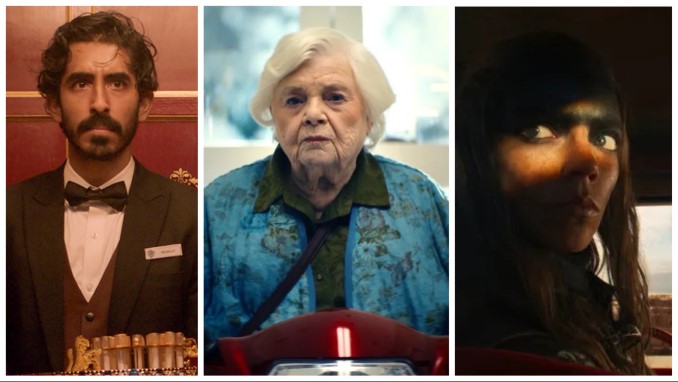
The best action movies of 2024 reflected something of a lower key year for the major franchises that have so defined the genre in recent memory: There was no Mission: Impossible, no Fast & The Furious, no Avatar, no Star Wars, no James Bond and only one feature film entry in the Marvel Cinematic Universe for once. And all the same, there was no dearth of more unconventional action heroes, whether it was Dev Patel making his directorial debut as an ape-masked avenger in Monkey Man, or 95-year-old June Squibb turning ascending a staircase into a death-defying stunt in Thelma. Turns out, the best action movies of 2024 were just waiting to step up to fill those shoes vacated by sleepier IP.
Here are the 15 best action movies of 2024:
15. Ultraman: Rising
Director: Shannon Tindle
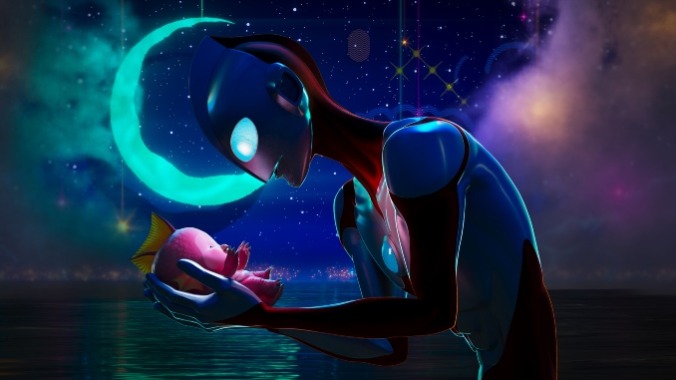
Of the many colorful characters conceived after the Godzilla-inspired tokusatsu boom, few loom as large as Ultraman, a superhero who grows to gargantuan proportions to protect Japan from supersized monsters. The big guy was so beloved that he helped usher in the Kyodai Hero subgenre, which is all about do-gooders who transform into giants so they can battle hulking creatures. Following a barrage of TV series that carries on to this day, word of the character’s exploits eventually went global, resulting in a worldwide fanbase that eagerly awaits the numerous shows, movies and videogames about this savior from the Land of Light. Ultraman: Rising, a new film from Netflix Animation, is the latest installment in this storied franchise, and unlike many other entries in the series, it feels tailor-made for newcomers. Through its colorful cuts of animation and superpowered antics, it’s a family-friendly film that hones in on the greatest battle of all: parenting.
The story follows Ken Sato (Christopher Sean), a legendary baseball player who moves back home to Japan at the prompting of his estranged father, Professor Sato (Gedde Watanabe). It turns out that his pops is Ultraman, and after getting injured on the job, he asks his son to take up the family business. Ken isn’t thrilled at the prospect, and he’s in the middle of balancing his life as a ballplayer and superhero when things get even more complicated. After a fight between a giant winged lizard and the anti-monster wing of the military goes sideways, Ken finds himself the parent to a 30-foot-tall baby kaiju. —Elijah Gonzalez
14. The Ministry of Ungentlemanly Warfare
Director: Guy Ritchie
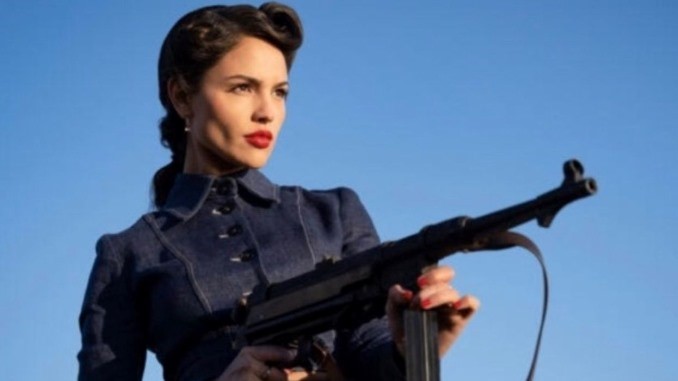
Guy Ritchie has become such a prolific and well-known director that it’s easy to forget that his first few films were released in the aftermath of the Quentin Tarantino explosion of the mid-1990s. In part, this is because Lock, Stock and Two Smoking Barrels and Snatch don’t actually resemble Reservoir Dogs or Pulp Fiction as closely as any number of more shameless rip-offs from that era, and by the time Ritchie was on the scene, Tarantino himself had moved into the more adult key of Jackie Brown, then the more gleefully rococo Kill Bill, largely abdicating the ensemble-criminal beat. Yet Ritchie’s early comic-gangster films still do feel connected to Tarantino, maybe because they concentrate the attitudes of a few key motifs or scenes – comic violence, irreverent dialogue – into firecracker cartoon versions. They’re almost like watching someone make a Tarantino pastiche based on the excited descriptions of 13-year-olds who snuck only illicit, incomplete peeks in between their Oasis listening parties. It’s surprising, then, the way that Ritchie circles back to knock off Tarantino more directly in The Ministry of Ungentlemanly Warfare.
It’s not surprising that Ritchie would do it – it’s actually a little stranger that later-period Tarantino hasn’t inspired more imitators – but that he makes such a relatively stolid, dad-friendly attempt. At the time of its release, some viewers were puzzled by the degree to which Tarantino’s Inglourious Basterds elided its titular band of Nazi-hunting commandos, bringing a few of them to the fore alongside their leader (played by Brad Pitt) but largely focusing on characters who intersect with the Basterds on their missions. Having Guy Ritchie direct a less ambitious version seems like the perfect opportunity to make a movie that’s more directly interested in a bunch of lads with easily identifiable characteristics, perhaps even colorful nicknames, scrapping and killing their way through World War II. This is a man whose mostly stoic, Los Angeles-set heist movie Wrath of Man still includes a bloke named Boy Sweat Dave; surely he could attempt to out-QT in assembling a bunch of disreputable, mostly British soldiers for a proto-black-ops mission to sink a German U-boat. —Jesse Hassenger
13. Blood for Dust
Director: Rod Blackhurst
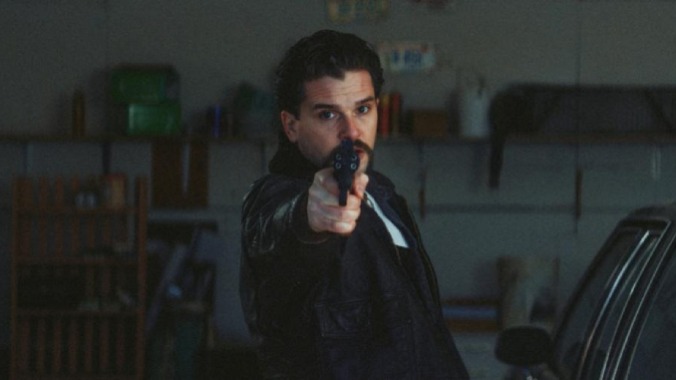
Rod Blackhurst’s Blood for Dust is the uncomplicated definition of a character study. There’s nothing groundbreaking about its themes or story. The picturesque “American Dream” becomes a rural, class-crunching nightmare about staying afloat by any means necessary. Blackhurst’s horror background as co-director of Night Swim (the short) and director of Here Alone doesn’t play into the gritty textural delivery of Blood for Dust, but terror isn’t a missing ingredient. He’s mostly capable and successful behind the camera, much like the film itself—mostly capable and successful.
Scoot McNairy stars as traveling salesman Cliff, at a crossroads, downtrodden and desperate. Enter Ricky (Kit Harington), an old colleague who opens the door to his illegal operations dealing anything from firearms to narcotics. Cliff’s unfortunate circumstances—a sick child with mounting hospital bills—steer him towards Rick’s offer despite the muck-up of their last endeavor. How long can Cliff pursue financial goals by lawful means and be left struggling before Rick’s opportunity becomes his family’s best chance?
Blood for Dust is a satisfactory interpretation of American hardships and making ends meet, one that’s been done plenty better and worse elsewhere. Blackhurst proves himself a workman behind the camera, albeit hindered by an elementary screenplay that feels like a first draft. Honestly and truly, it’s fine. I know that’s not the enthusiasm or disdain a critic might usually bring to a review, but most movies are plain ol’ alright, and that’s the reality of this gig. Blood for Dust fits that inoffensive and palatable classification relatively well, which doesn’t make a splash—although it’ll provide plenty of solid material for Blackhurst’s directorial sizzle reel. —Matt Donato
12. Beverly Hills Cop: Axel F
Director: Mark Molloy
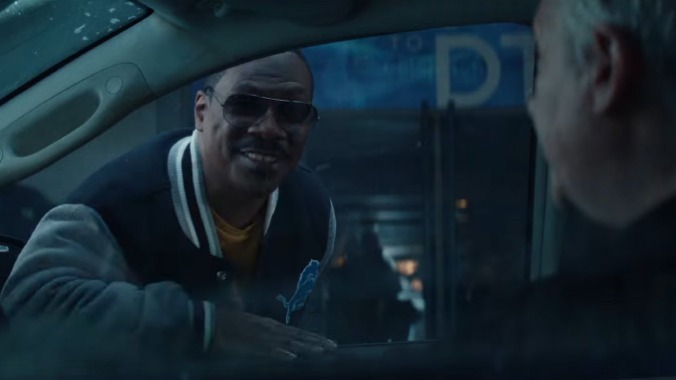
Does Beverly Hills Cop: Axel F atone for the sins of 1994’s Beverly Hills Cop III? That’s what debut director Mark Molloy hopes in his 30-years-later nostalgia grab to reinstate Axel Foley as an action-comedy mainstay. A script written by Will Beall, Tom Gormican, and Kevin Etten recycles every franchise-pandering trick in the book, reworking old formulas into a generational story that tees up future installments with younger partners who can aid Axel on future investigations. It’s nothing groundbreaking, nor does Molloy subvert expectations like the recent comparison point Bad Boys: Ride or Die, but if you’re a fan of the wisecracking Beverly Hills Cop series, 2024’s long-awaited entry is a comfortably familiar, stays-in-its-lane continuation.
Eddie Murphy’s return to Beverly Hills as Detroit lieutenant Axel Foley is a family reunion. Axel’s estranged daughter, Beverly Hills criminal defense lawyer Jane Saunders (Taylour Paige), is being threatened for representing a client she claims was set up by crooked law enforcers. Axel’s no parent of the year, hence why Billy Rosewood (Judge Reinhold) is the one who reaches out to Axel about Jane, but that doesn’t stop him from booking a flight to California. It’s not long before Axel is stealing traffic patrol vehicles and snooping around Beverly Hills’ finest, working alongside new faces like Jane and reluctant partner Detective Bobby Abbott (Joseph Gordon-Levitt), as well as longtime friends like John Taggart (John Ashton), now Beverly Hills’ chief of police.
Beverly Hills Cop: Axel F is a standardized comeback that moderately succeeds in balancing tradition with reinvention. The film doesn’t kick your door down and challenge your Beverly Hills Cop fandom—Molloy knocks politely on your door and shows you what you want to see. It’s a humble nostalgia bomb à la Live Free or Die Hard, one afraid to upset the apple cart and detrimentally one-note. But Eddie Murphy’s still Eddie Murphy, and that’s like sneaking in a cheat code. Molloy feeds us the franchise’s signature recipe with a spice or two switched, tending to the core flavors while tweaking just enough to justify the repackaged new release. Redemption, thy name is “Axel F.” —Matt Donato
11. I.S.S.
Director: Gabriela Cowperthwaite

Dr. Kira Foster (Ariana DeBose) is the newest member of the I.S.S. crew, a biologist who joins NASA to develop cutting-edge organ replacement research that can save lives. She joins a team that’s a 50/50 split between American astronauts and Russian cosmonauts, a seemingly friendly bunch who carry out a warm welcome celebration for the fresh recruit on her first day. However, during the merrymaking, a colleague offers a word of advice: To work in harmony, it’s essential to leave politics at the door.
Unfortunately, this tip becomes difficult to follow after the group witnesses something unbelievable. While looking down at North America, they witness a flash on the surface so big it can be viewed from orbit. And then another, and many more. High-ranking NASA astronaut Gordon Barrett (Chris Messina) and his Russian counterpart Nicholai (Costa Ronin) receive private messages from their respective governments that America and Russia have engaged in a nuclear war. They both receive orders to take the station “by any means necessary.” Delivering close-quarters anxiety, I.S.S. is unrelenting. Shortly after its early turning point, tensions exponentially escalate as these people size up if they think their former friends can do the unthinkable. Nick Remy Matthews’ intimate camerawork captures this constant proximity to potential enemies, and early scenes are rife with the captivating sense that things will go sideways at any moment. —Elijah Gonzalez
10. Twisters
Director: Isaac Chung
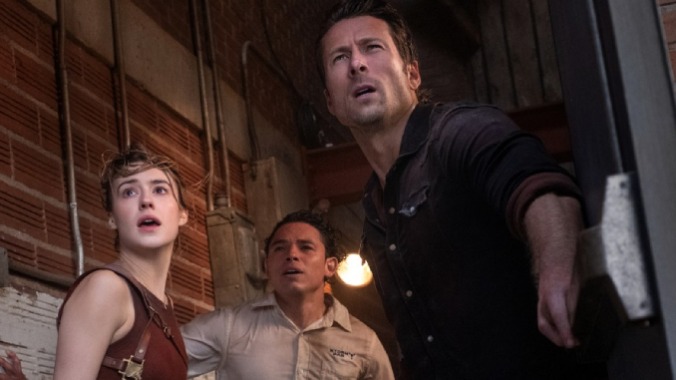
A follow-up to his poignant, Oscar-nominated autobiographical drama Minari, Twisters might seem like an odd fifth feature for director Lee Isaac Chung. Odd, yes, to those with little knowledge of the film industry and a lot of straightforward common sense—why hand a filmmaker by all accounts concerned with small, personal features the keys to a blockbuster franchise sequel? But that’s just Hollywood de rigueur, seen with the likes of Jurassic World and the MCU, often to, shall we say, mixed results. Studios like to slap an indie up-and-comer’s name on a feature while allowing them little to no real creative leeway, giving the illusion of artistry and progress while the suits at the studio pull all the strings. And while there is no outwardly auteurist stamp on Twisters to make it feel like anything other than that Chung was a hired hand, Twisters certainly isn’t Eternals. On the contrary, Twisters is, at best, pretty fun—a decidedly breezy two hours. It has thrills, and chills, and Glen Powell doing his darndest to bring the concept of “movie star” back into the year 2024. The tornado effects are impressive (special effects supervisor Scott R. Fisher was also in charge of the VFX on Oppenheimer), especially on an IMAX screen. And there is a not insignificant push of focus onto the casualties of tornadoes in contrast to the original 1996 film, which gives the sequel a more present sense of scale and tragedy. —Brianna Zigler
9. Gladiator 2
Director: Ridley Scott
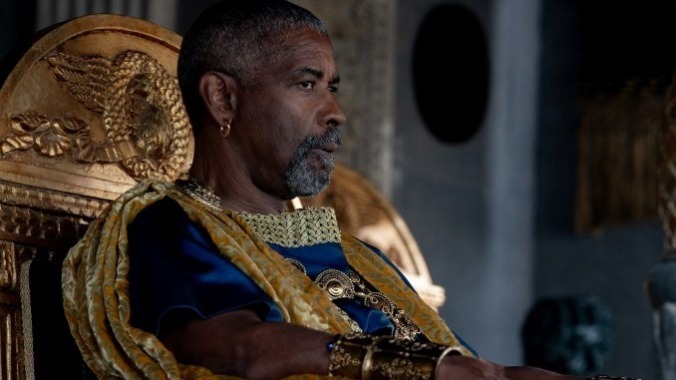
Befitting Scott’s fusion of auteur surehandedness and journeyman churn, the deeper reasons for Gladiator II’s existence may not emerge in a single viewing, and the movie – while sufficiently entertaining – does not exactly beg for a revisitation to investigate further. It picks up the story thread of Lucius, the tweenage son of Lucilla (Connie Nielsen), ex-flame of Russell Crowe’s Maximus, from the first film. Lucius has grown into a warrior in his own right, now played by Paul Mescal, and first seen defending Numidia, on the North African coast, from invading Romans led by Marcus (Pedro Pascal). Lucius fights alongside his wife Arishat (Yuval Gonen) and if that sounds like a nice change-up from the women-and-children peril of the first movie, well, wait a few minutes. After all, something has to happen to enslave Lucius, put him in the Coliseum to fight for his life, and prompt him to swear revenge against some enemies.
Yes, the broad outline of Gladiator II is basically: What if something kinda similar to Gladiator happened again, but somewhat later? There’s a big battle, a defeat, a bunch of palace intrigue, some arena set pieces, further intrigue, and a final confrontation. The difference-maker here – the reason it actually feels like a worthwhile sequel rather a crude reiteration – is Denzel Washington as Macrinus, a character whose own scheming agenda doesn’t have a precise parallel in the first movie, and remains gratifyingly opaque through at least part of this one. Macrinus is a former slave and sort of a second-century fight promoter; he gets ahold of Lucius and arranges battles for his own gain, with an eye on brothers Geta (Joseph Quinn) and Caracalla (Fred Hechinger), the co-emperors of a declining Rome. The battle sequences, most notably an elaborate circus wherein the Coliseum is filled with water so that the gladiators can endure naval clashes in shark-filled fake seas, are impressively mounted, with well-integrated visual effects and all of the big-money pomp you’d expect from an ante-upping sequel. —Jesse Hassenger
8. Bad Boys: Ride or Die
Directors: Adil El Arbi, Bilall Fallah
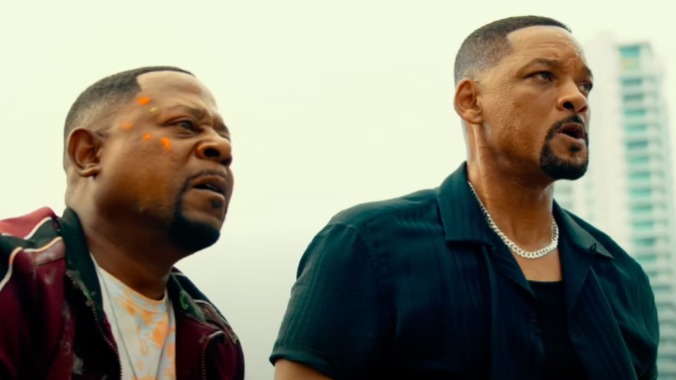
This is the buddy-cop dynamic this franchise has codified thus far: Marcus spends much of his character arc convincing Mike to tone down the bodycount, while Mike slowly comes to realize the consequences of a life beset on all sides by the endless death he’s wrought. If the Bad Boys movies are mostly about the war raging in the soul of America’s ideal psychopath supercop, then Bad Boys: Ride or Die paints that war with big and shameless Fast & Furious ambition, no longer questioning if Mike should kill, but why he does. Is he a Bad Boy, or a Good Boy who is so Good at doing Bad things that he’s cosmically aligned with the nature of the Bad Boy? Is he the monolithic Good-Bad Boy, a true representation of punitive justice in its purest form? Bad Boys: Ride or Die is a genuine crowd-pleaser, just undeniably captivating, funny and raging, neon-pink copaganda. It serves as both a fitting end to the franchise, while leaving room to make one more. And if that happens, I will be seated. —Dom Sinacola
7. The Order
Director: Justin Kurzel
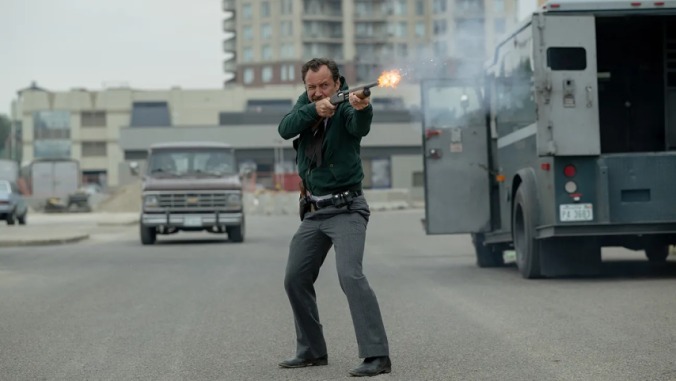
Directed with a cool precision by Justin Kurzel, and based on the non-fiction book The Silent Brotherhood, the film follows a burnt-out agent appropriately named Husk, who in turn is played equally appropriately by a man named Law. We’re treated to a grizzled, cigarette-chomping mustachioed Jude Law looking like he’s been run over by a liquor delivery truck, and the result is fantastic, a composite character reflecting the realities of those that did the actual investigation, heated up to a hard boil, and exactly the kind of cop (too cerebral for his own good) that elevated 1970s cinema.
Moving to Idaho to remove himself from the turmoil of taking down the New York mob, the restless agent soon finds himself part of a more local affair, connecting the dots between bombings of porno houses, bank robberies, and the rise of a reactionary right wing group intent on causing political havoc.
The Order is a fine police thriller in an escapist sense, but it also illustrates the cancer of hate at the heart of an increasing number of those in America. Beyond mere existential cynicism, this is a fruitful reminder of the ideological fault lines that continue to be a source of death and destruction. Rather than being polemical or didactic, The Order simply manages to be truthful, exposing the insidiousness of this type of counter-reaction and how, thanks to charismatic leaders, the weaponization of grievances can lead to grievous actions. With great performances, a taut script, and an execution an order of magnitude better than Kurzel’s previous films, The Order provides a chilling yet compelling look into the past—and the same forces shaping our present. —Jason Gorber
6. The Killer
Director: John Woo
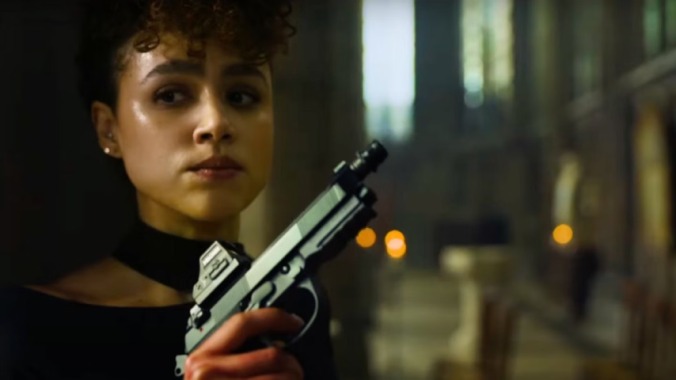
Of course, John Woo would know best how to stage Paris to best service his signature style of operatic killing and mayhem. When body parts or spurting blood aren’t flying into frame, you’d almost believe Woo has gone soft with how lovingly he stages the city to host the remake of his 1989 Hong Kong action classic, The Killer. It’s either that or he got some sweet tax credits to hide a beautifully lit advertorial for the city inside his carnage-filled drama.
The more pertinent question is why is Woo revisiting The Killer some 35 years after he already did it right the first time with actors Chow Yun-fat and Danny Lee? The answer is that for 32 of those years, Woo was attached to produce a remake that never ended up happening, despite a steady stream of filmmaker interest over its many screenplay iterations. It wasn’t until 2015 that a revised script by writers Brian Helgeland, Josh Campbell and Matt Stuecken, which flipped the gender of Yun-fat’s assassin character, wooed Woo back to Hollywood to reimagine his classic.
All of the various storylines coalesce together in a bullets-blazing, battle royale finale that’s about 10 minutes and two setpieces too long. It does prove that Emmanuel’s got action star chops, and I wouldn’t be mad if she and Sy were reunited in a sequel that sent these two outsiders out on another adventure together. —Tara Bennett
5. The Fall Guy
Director: David Leitch
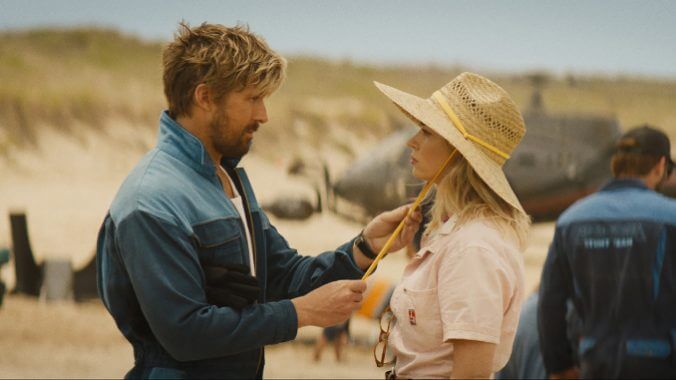
The deceptive difficulty of action movies, comedies, and their intersection is being able to do something completely stupid with total straight-faced commitment. Like so many easily dismissed parts of film production, a punchline delivered with invested emotion is just as hard to pull off as a pratfall performed with total abandon. If either misses its mark by a hair, you fall flat on your face and leave the audience hating your smug performance or hyperactive flailing. It’s all the more impressive, then, that Ryan Gosling does it all in The Fall Guy. He plays stuntman Colt Seavers, living bruise, returning to action One Last Time in order to help his old flame Jody Moreno (Emily Blunt) on her first directorial effort, Metalstorm. That’s the simple set-up, designed to showcase the jock rock of filmmaking: A stunt spectacular combining the technical prowess and meathead charm of the dirtbag daredevils behind every awesome car crash and killer fight scene. And, thanks to Gosling—playing his role like his schmuck detective from The Nice Guys accidentally found himself in a Mission: Impossible—the film breezily flits between a savvy behind-the-scenes pastiche and a committed action rom-com. Ok, The Fall Guy owes its success to far more people than its leading man. That’s kind of its point. Directed by longtime stuntman David Leitch (with this film, distancing himself from solely being the less impressive half of the John Wick team) and written by Drew Pearce (one of Leitch’s Hobbs & Shaw scribes), The Fall Guy works best as an anti-blockbuster. It wants to blow shit up and wow us with its ballsy choreography, but it also wants to take the shine off these feats of movie magic. Funnier and more effective than most movies built upon a foundation of car chases and fistfights, The Fall Guy is smart enough to showcase its dumb action in a new and exciting way. Its affection is infectious, whether that’s for the art of filmmaking, the haywire pleasures of being on set, the adrenaline rush of a well-made gamble, or for finding someone special to share your simple corner of the world. The ambitious meta-film overcomes the baggage of trying to be both the movie of the summer and the movie that comments on those kinds of movies, hitting a cinematic sweet spot and singing the praises of stunt performers everywhere.–Jacob Oller
4. Thelma
Director: Josh Margolin
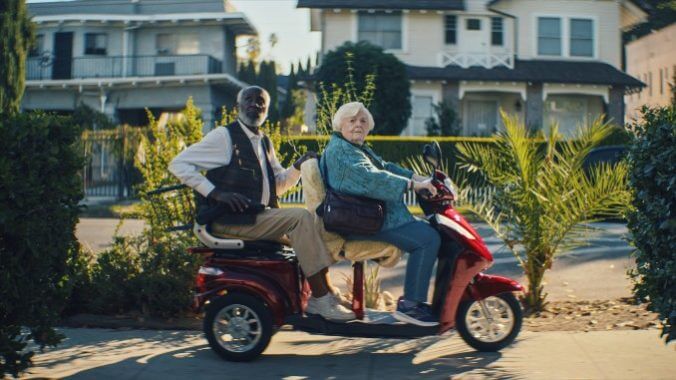
Every good action hero knows you’ve got to stick to your guns. Ethan Hunt is a marathon-running master of disguise. John Wick has never lost count of his remaining bullets. Jackie Chan’s various inspectors and agents view the world as their personal set of monkey bars. When writer/director Josh Margolin’s debut Thelma keeps its sights trained on its rogue granny on a mission (June Squibb), its hilarious geriatric reframe of action-movie tropes has a game champion. Like its absentminded hero, the film can sometimes get sidetracked right when things are getting good, wandering down schmaltzy or twee narrative paths. But when it lets Thelma (and Squibb) do her thing, the comedy is perfectly cute and a stellar showcase for what an actor’s late career can offer.
In fact, much of Thelma is about adjusting our ideas around aging. There’s novelty in the comedic turns from the 94-year-old Squibb and her 81-year-old co-star, Richard Roundtree (in his final film role). These actors get to tap a well that’s unique to their age and the genre without sticking them into the boxes that generally contain old performers. They’re not utterly dignified, wisdom-dispensing elders. They’re not tragic victims of time. And they’re certainly, blessedly not the dreaded “rapping grannies” who are more punchline than performer. As the pair abscond on their quest to retrieve Thelma’s stolen savings, solicited from her cookie jar and mattress by phone scammers, they’re clearly complex, pulling off warm humor, endless charm and impressive stunts. A 94-year-old doesn’t have to ride a motorcycle off a cliff to make you gasp. —Jacob Oller
3. Monkey Man
Director:
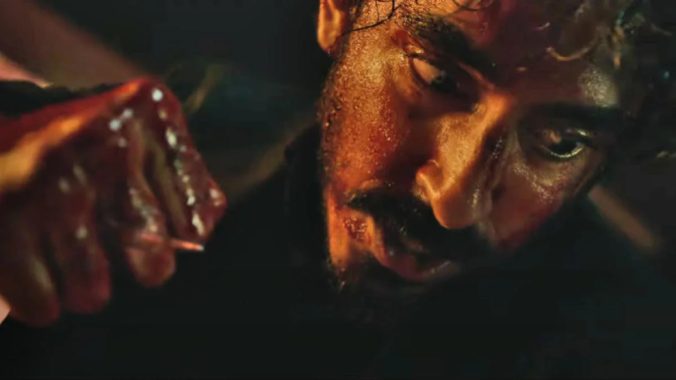
Despite the desires of the internet, Dev Patel clearly never wanted to be James Bond. He wanted to be Rorschach. Patel’s directorial debut, Monkey Man, fashions its Hanuman-based action hero after the big, brash mythologies of Indian epics and comic book vigilantes. Delicate moralities have their faces smashed against toilet bowl porcelain, and nuance has its bones cracked by a kitchen-sink adoration of grisly action styles. The result is an unwieldy flurry of blows, unleashed by a whirling dervish filmmaker battering us with his influences. It’s a familiar chaos, and one that threatens to get away from the person trying to contain it, but with the extra sauce of a passion project. From John Wick to Jackie Chan and Bruce Lee movies to the Ramayana, Patel poured his fascinations into his frenetic fable. Monkey Man finds itself in the final round, however, landing combo after bloody combo as it ascends towards actually reaching its wild-eyed ambitions.
And those ambitions are shared by Kid (played by Patel), who we meet as a living, breathing Chumbawamba song. He gets knocked down and gets back up again, professionally. When not spitting blood as the fall guy in an underground MMA match (overseen by peacocking ring announcer Sharlto Copley), he’s scraping for stolen dollars with his network of impoverished peers. This is all in service of his ultimate goal: Revenge on the men who destroyed his idyllic rural life and family.
Not an especially original premise, and—as Kid infiltrates the high-end club his cop target (Sikandar Kher) frequents—not an especially original execution. But Kid is a being of endless energy and rage, an underdog driven by a baked-in action-movie assurance: If he just beats the hell out of enough people, he’ll have fixed things.
2. Rebel Ridge
Director: Jeremy Saulnier
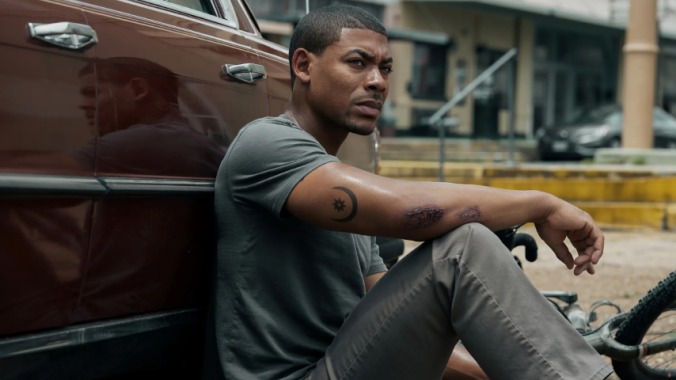
Writer/director Jeremy Saulnier’s films are never shy about abrupt savagery born from endlessly escalating suspense. Both Blue Ruin and Green Room assemble whole cosmologies of tension around the series of decisions that must be made by people totally unprepared for the graphic afterbirth of very simple violence. In Green Room, Pat (Anton Chekhov) and his poor touring punk band are so callously unready for the slaughter to greet them at a white supremacist bar in rural Oregon (go figure) that they cover Dead Kennedys’ “Nazi Punks Fuck Off” for a room full of skinheads. The nightmare that follows isn’t the direct result of their song choice, but punks aren’t known for self-preservation either.
Rebel Ridge is Saulnier’s second film for Netflix after 2018’s dreamy, dreary Hold the Dark. An open riff on First Blood, with shades of the 1973 Joe Don Baker vehicle Walking Tall, Rebel Ridge also feels like a determined return to the relentlessness of Saulnier’s first films. But as Terry’s plans unravel and contingencies disappear, Saulnier doesn’t double down on the grisly nature of Terry’s fate. Instead, with Pierre’s disarmingly symmetrical face carrying the majority of Rebel Ridge’s frames, the writer-director’s never been more restrained. Without breaking into gnarly gore like in Green Room, nor surprising with a burst skull or two like in Blue Ruin, the film barrels forward heedlessly, every conversation, interaction and inevitable smoke-swathed shoot-out about the way power is wielded and manipulated between characters. Even steeped in political commentary, Rebel Ridge is breathlessly staged. —Dom Sinacola
1. Furiosa: A Mad Max Saga
Director: George Miller
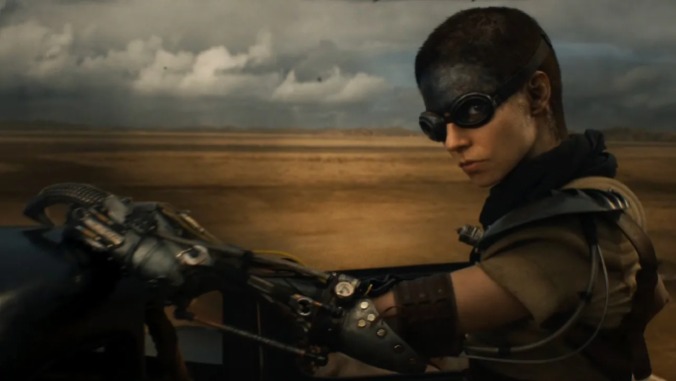
If you ever took a class on the Greek classics, you might remember that the epics of Homer are defined by their first words. The Odyssey is the story of a “man,” while the Iliad is a story of “μῆνις,” which is often translated as wrath, rage…or fury. The epics of George Miller barely need words at all, yet Furiosa: A Mad Max Saga is the Iliad to Fury Road’s stripped-down Odyssey. The latter’s elegant straight-line structure is replaced with lush chapters, documenting the interconnected systems of post-apocalyptic nation-gangs through the years. Through it all, a Dickensian hero clings to this world’s seedy undercarriage. Reducing Furiosa down to a single word does it as little justice as it does the sagas it scraps, welds and reuses like its countless Frankenstein vehicles. But understanding George Miller’s Fury Road prequel as the story of war—of sprawling futility, driven by the same cyclical cruelty that turned its deserts into Wastelands—makes it far more than a satisfying origin story. (Though, it’s that too). Furiosa speaks the language of epics fluently, raging against timeless human failure while carrying a seed of hope. What we learn, we learn through the eyes of Furiosa, from the moment she’s ripped from the Green Place of Many Mothers as a child, to the second before she tears out of Immortan Joe’s Citadel, smuggling Fury Road’s stowaways. As Furiosa grows from traumatized child (Alyla Browne) to damaged adult (Anya Taylor-Joy), she survives the slave-labor bowels of the Citadel, claws her way into a position aboard a trade caravan and waits for the perfect moment to enact revenge upon her initial captor, the chaotic, power-hungry biker warlord Dementus (Chris Hemsworth). Pushing back on the various men who hunt them, Browne and Taylor-Joy’s performances work in stunning tandem, steadily heating the steely young girl’s resolve until it turns molten. When you match the most powerful eyes in the business with Miller’s evocative framing (Furiosa is shot a bit like Galadriel’s brush with evil in Lord of the Rings—somewhere between avenging angel and Frank Miller cover), you get all the character you need. Each action scene, whether another amazing chase or a desperate rescue mission deep in enemy territory, is driven just as deeply by visual logic as by spectacle. These stunning visions of neo-medieval torture in Hell’s junkyard only work if we can make sense of it all. Furiosa is a film well-planned and deeply dreamed. Miller’s movies strip folkloric epics down to their basic mechanical parts, functional skeletons that run on raw emotion like the war machines running on piss and guzzolene.–Jacob Oller






































